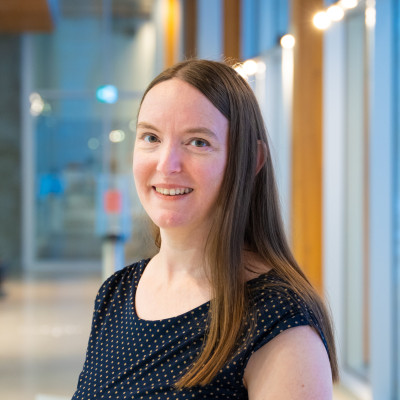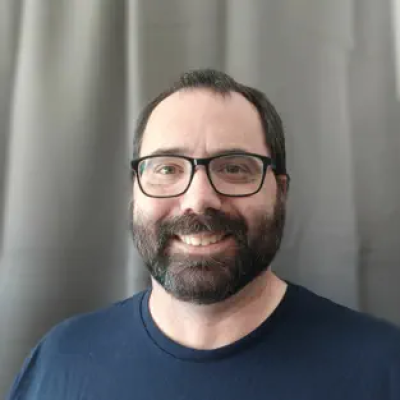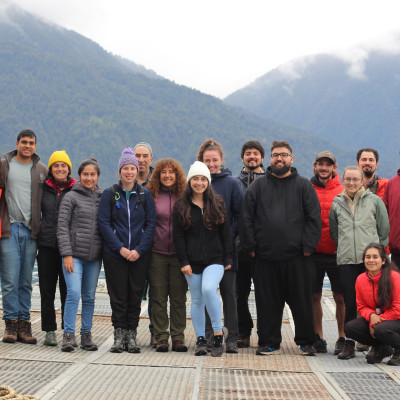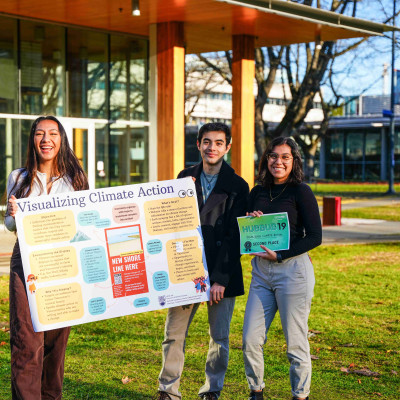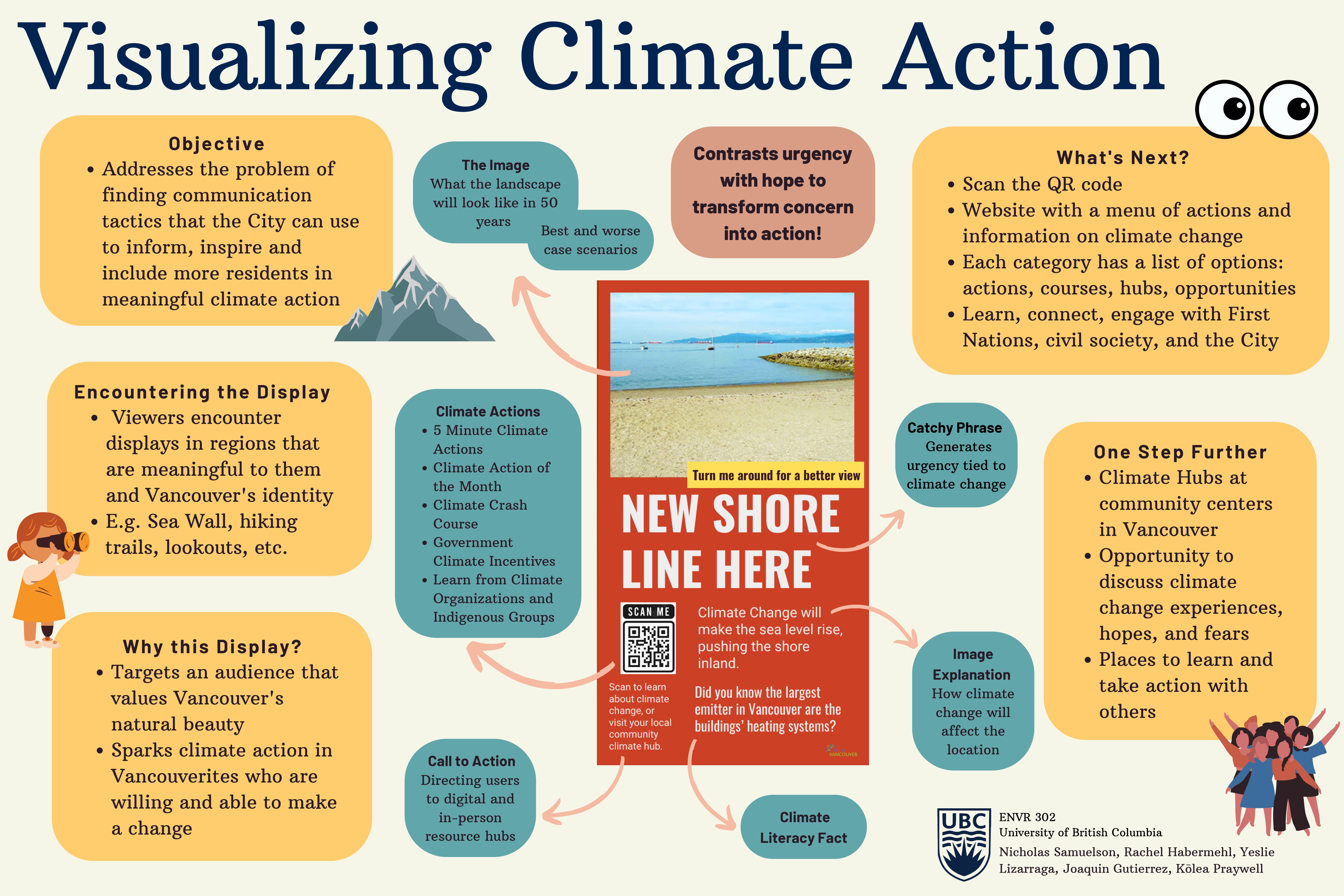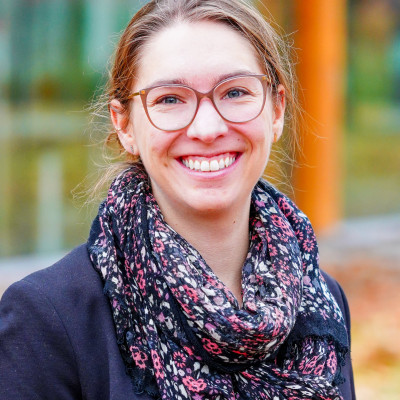News
Stay up-to-date with what's happening in EOAS
Dr. Laura Lukes elected as President-Elect of the AGU Education section
Dr. Laura Lukes, Assistant Professor at EOAS, has recently been elected as President of the American Geophysical Union (AGU) Education Section. Scroll down to watch our interview with Dr. Lukes regarding her new role and some current and future projects she’s excited about!
Dr. Lukes’ research seeks to advance our understanding of how people learn in geoscience contexts in order to design better learning experiences in formal (e.g., courses) and informal settings (e.g., museums), thus strengthening the preparation of the geoscience workforce to solve the complex Earth challenges humans face. She has been Founding President of National Association of Geoscience Teachers (NAGT) Geoscience Education Research Division, Special Interest Group Chair of POD Network Scholarship of Teaching and Learning, and Chair and member of Geological Society of America Geoscience Education Committee. She has also served as Co-Convener on four geoscience education related sessions at AGU conferences.
In a Q&A with AGU, Dr. Lukes shared identities, voices, and perspectives she would bring. “As an instructor who has taught across academic levels from high school, community college, and university, I bring experience and practical understanding of teaching and learning practices across educational pathways. As a geoscience education researcher, I bring experience and insights into how teaching and learning practice connects to theory and vice versa. As a recent immigrant settler and uninvited guest on the traditional, ancestral, and unceded territory of the xʷməθkʷəy̓əm, I bring the perspective of a learner. As project lead on the collaborative Earth Science Experiential and Indigenous Learning (EaSEIL) project at the University of British Columbia, I bring the voice of a connector, bringing people together to advance inclusive teaching practices in the geosciences.”
Read Dr. Luke’s Q&A with AGU here.
Meet Dr. Jim Evans - Mineralogist
Dr. Jim Evans is a mineralogist/physicist who is interested in the structure of minerals at the atomic level. He is an instructor in the Department of Earth, Ocean, and Atmospheric Sciences and the Integrated Science program at UBC. At EOAS he studies the crystal structures of unusual minerals like dumortierite and harkerite. Dr. Evans received his PhD in Physics from the University of Ottawa in 2006, and did post-doctoral studies at the University of California, Davis in 2008, and at UBC with Dr. Lee Groat from 2009-2014. Amiong his non-science interests he likes tea, cookies, math, Lego, and cats.
PhD student Darius Kamal awarded the 2023 Mary-Claire Ward Geoscience Award
Darius Kamal, a Ph.D. student in EOAS under the supervision of Ken Hickey, has been awarded the annual Mary-Claire Ward Geoscience Award for 2023. Each year this award is given to a graduate student in Canada whose thesis embodies the objective of increasing our knowledge of Canada’s geological history through field mapping.
Darius’ Ph.D. research aims to establish how rock deformation during tectonic collision events, which have led to the formation of western Canadian mountain ranges, impacts the distribution, preservation, and grade of sulfide-rich ore deposits. Darius’ research is focused on the region of the Selwyn basin around and between Howard’s Pass and Macmillan Pass deposits in eastern Yukon. Darius’s uses a number of geoscience methods to characterize the rock layers of the basin, integrating kinematic and microstructural analysis, Uranium-lead (U-Pb) carbonate dating of veins, whole rock and mineral geochemistry, micro- X-ray fluorometry, scanning electron microscopy, and Electron Backscatter Diffusion (EBSD) mapping. Darius’s research will not only significantly contribute to our understanding of the structural development of the Selwyn basin and the tectonic evolution of the Canadian western mountain ranges, but will also expand our knowledge of mineral system science of similar such deposits.
The Mary-Claire Ward Geoscience Award is administered by the Geological Association of Canada (GAC), the Prospectors & Developers Association of Canada (PDAC), the National Geological Surveys Committee, the Canadian Geological Foundation, and Watts, Griffis and McOuat Ltd.
PRODIGY wraps up two weeks of field school in Northern Patagonia
Students and professors involved in the PRODIGY program are returning home after two weeks of intensive field school at the Foundacion San Ignacio del Huinay. The foundation’s field station is located on the shore of the Comau Fjord, one the many fjords that make up the extensive Patagonian fjord network.
During the first week of field school, PRODIGY Year 1 students designed research projects, collected oceanographic data across Comau Fjord, and capped off the week by presenting their findings. During the second week, the Year 2 cohort completed their own research projects. Research questions covered a broad range of topics, including: surface and intermediate water circulation patterns in the fjord, dissolved oxygen dynamics in the fjord, and an investigation of a potential fault line in the ocean floor of fjord.
The PRODIGY (Pacific Rim Ocean Data Mobilization and Technology) program is designed to train future ocean leaders across every stage of the ocean data life-cycle; from initial sensor development and testing, to using data-driven findings to engage community stakeholders and policy decision-makers. Students and post-doctoral fellows in the program represent a selection of Canadian and Chilean institutions including: Universities of British Columbia, Waterloo, Victoria, and Concepción. Participants also come from a wide range of academic backgrounds, such as oceanography, geophysics, and computer science.
PRODIGY fosters interdisciplinary and international collaboration among early-career scientists studying coastal areas facing similar challenges: rapidly growing aquaculture industries, communities developed in zones subject to earthquake and tsunami risk, and changing physical and biogeochemical within delicate fjord ecosystems. The program is funded for another three years. Those interested can view the available positions and supervising faculty here.
Visualizing Climate Action won second place at HUBBUB
Last December, the Visualizing Climate Action team from the Climate Action Lab won second place at HUBBUB, a City Hall event where students share innovative ideas and solutions for city-building with City staff and elected officials.
Members of the team come from a variety of backgrounds; they include Nicholas Samuelson (Cellular, Anatomical, and Physiological Sciences), Rachel Habermehl (Geographical Sciences), Yeslie Lizarraga (Sociology), Joaquin Gutierrez (Integrated Sciences integrating Climate and Sustainability), and Kōlea Praywell (Environment and Sustainability).
The Visualizing Climate Action project uses displays to visualize climate action in Vancouver (see poster below; click to expand). The displays link climate change to meaningful places that people already treasure and care about. “We want to make climate change personal to people, so it's easier for them to act upon it,” said the team. “The bond people have with physical locations and resources allows them to tie their climate action into a concrete contextualized goal in a hopeful tone.”
One of the highlights of the project is that it can engage people. “Our main goal is to engage as many people as possible as quickly as possible. Whether or not you want to, you are going to get engaged when you see the display.” Some of the comments the team received from the City of Vancouver was that targeting and working with emotions was unique. In addition, the displays will direct people to climate resource hubs that the community already has, making it easier for people to learn and act.
When asked about their motivation for the idea of visualizing climate change, the team said that they actually had several hour-long meetings when they started the project, just to go through all their ideas. The display idea came up early and they thought it was very engaging. Then they wanted to connect it to something that Vancouverites are identified with, one of which is climate - the beautiful scenery people live in. By combining the display and climate, the team wanted to give people a sense of discomfort about their surroundings by showing them what they will encounter in fifty years if they don't act now. “We got a lot of positive feedback on targeting emotions, but we also need a sense of hope for people to have something to work towards,” said the team. Therefore, climate resources were also integrated into the display to show people how to take action to prevent that discomfort from happening in the future.
The experience of working alongside the City of Vancouver and participating in HUBBUB was memorable, according to the team. “We engaged with all the people we talked to and especially, a lot of people that work in the City. It felt collaborative that everyone wanted to hear what we had to say.” They also had some great conversations with the audience, such as discussing how many changes have taken place in the city over the past 50 years. “It was interesting to see how people can think of changes that we didn't necessarily know before.”
The team was glad that they took the jump by targeting people’s emotions and managed to bring a sense of hope with climate action. "It was scary to do something different, but we took a chance and it definitely paid off. We received a lot of positive feedback at HUBBUB. Everyone we gave a presentation to left happy and gave us good comments.”
The City of Vancouver is now offering an internship for a graduate student to follow up on this work through the Sustainability Scholars Program. Description of the Visualizing Climate Action project can be found here: 2023-054 Development of graphics to visualize climate action and inaction in Vancouver. Deadline to apply is January 29.
New Geophysical Inversion Facility Director - Dr. Lindsey Heagy
Dr. Lindsey Heagy, Assistant Professor at EOAS, has taken a new role as Director of UBC-Geophysical Inversion Facility (UBC-GIF).
Dr. Heagy is interested in data science and inverse theory applied to questions in resource exploration, groundwater, and environmental studies. She is also a faculty member of UBC’s Mathematics of Information, Learning and Data (MILD) group, focusing on machine learning and inverse problems. Her research group primarily focuses on machine learning and inversion methods with geophysical data including electrical and electromagnetic data as well as potential fields (gravity and magnetic data) to characterize the subsurface.
“I am very excited to be taking on the role of director of the Geophysical Inversion Facility (GIF),” said Dr. Heagy. “We are at an important point in time for near-surface and applied geophysics. There are significant opportunities for geophysics to play a role in solutions to challenges we are facing in society, especially in light of the climate crisis. Locating and managing groundwater, monitoring CO2 sequestration, characterizing permafrost loss and other impacts of climate change, and importantly locating the mineral resources we need to facilitate the energy transition, are all applications where we require the ability to image the subsurface. Geophysics gives us the ability to do this by measuring data over the surface of the earth that are sensitive to variations in physical properties of the subsurface. The Geophysical Inversion Facility is focussed on developing computational methods for extracting insights from geophysical data.”
Over the past 30 years, GIF research, under the leadership of Doug Oldenburg, has laid the foundation for the ability to simulate and invert a wide range of geophysical data, including gravity, magnetics, electrical, and electromagnetic data to obtain physical property models of the subsurface. “We now have the ability to solve problems that work with hundreds of thousands of data where we are estimating millions of model parameters. The next generation of GIF will build upon this foundation and integrate advances in machine learning,” said Dr. Heagy.
Dr. Heagy also shared about what she and the GIF hope to achieve in the next few years. “Our goal is to contribute to solutions of problems that are important to society. Locating mineral resources, managing groundwater, monitoring CO2, or remediating land are inherently interdisciplinary questions. Geophysics has a role to play, and the more that we can integrate with other disciplines, the more value geophysics can bring to the table. Our research develops computational methods that enable the integration of information, including geophysical, geological, geochemical, and other data to obtain insights about the subsurface. GIF has established itself as a leader in numerical simulations and inversions; in the next few years, an emphasis of our research will be on the integration of machine learning with inversions.”
“Two important components that have contributed to the success of GIF have been the close collaboration with the mining industry, which has provided data and research questions, and the subsequent dissemination of our work through the distribution of production-quality software. In our next phase, we plan to continue working with industry-relevant data sets to help formulate our research questions and solutions, and to keep distributing software to enable this work to be useable by others. The GIF Fortran codes are widely used by industry and academic groups worldwide. In the next few years, we will transition our model of software dissemination to an open-source model of development, through the SimPEG project. Collaborations through SimPEG have already facilitated humanitarian projects aimed at locating potable drinking water, as well as new ways to collaborate with industry because anyone can use, build upon and contribute to the project. I am looking forward to exploring new modes of collaboration that are enabled by the transition to an open-source model of dissemination.”
“GIF 2.0 is composed of a talented team of students, postdocs, and research associates working on projects in mineral exploration, groundwater, CO2 sequestration, and environmental applications. Connections with industry provide context and data on problems that are important to solve, and open-source software provides avenues for our work to contribute to solutions. We have the ingredients to make some meaningful contributions and I am excited to see what we can achieve together,” said Dr. Heagy.
To learn more about the UBC-GIF, such as their program, people, research and publications, software: https://gif.eos.ubc.ca/about
Listen to our podcast with Dr. Heagy: https://podcasts.apple.com/ca/podcast/on-earth-with-dr-lindsey-heagy-geo-data-scientist/id1562034229?i=1000525904011
